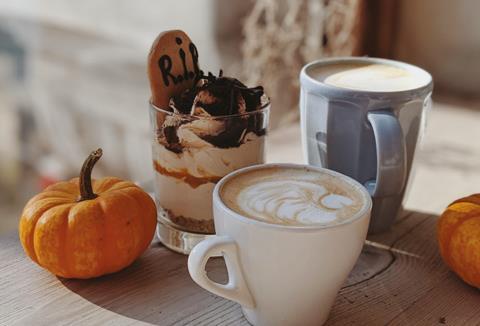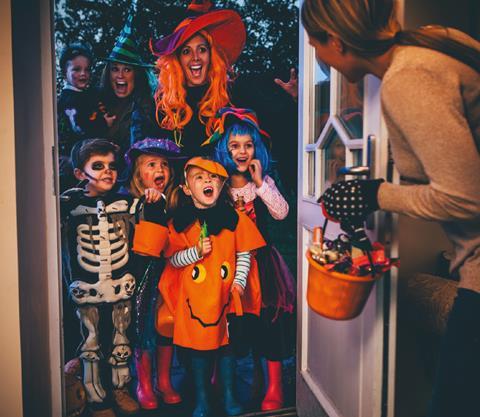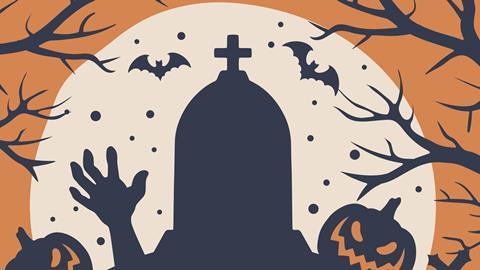The Church has traditionally shunned the festival, claiming it celebrates evil. Chris Witherall shares an alternative perspective
There are close to 8 billion people on the planet, and we all see things differently. We hold our humanness in common but our cultures vary wildly. Hop on a plane and you can watch the demolition derby in the United States; fly the other way and you can visit Japan, where it’s impolite to walk while eating. Here in the UK, we’re renowned for our patient queuing and our obsession with the weather. These society-wide expressions of identity may display our differences but they also provide an opportunity for connection. When someone understands our culture, it’s easier to communicate with them in a meaningful way.
In the UK, autumn contains a number of cultural touchstones, from Bonfire Night to Advent. Many of us look forward to the refreshing chill, the changing leaves and the scent of wood smoke. Autumn carries a special promise of magic and adventure. It’s a season of golden light, pub fires and bright stars; of frost-tipped grass and warm desserts. It’s the perfect season for a good story: the known world seems to peel back its skin to reveal layers of dream and near-dream, which makes it easy to step into the imaginary. For me, no single day ties all of this together like Halloween.
THE THRILL OF MYSTERY
As a child, my family gave Halloween a wide berth. We didn’t fear it; it just wasn’t for us. Like many Christians, we saw it as a day to celebrate or imitate evil. It’s easy to see why: during Halloween, people dress to look demonic, psychotic or – at the very least – a little bit melancholic. Many Christians feel concern that people will be lured into witchcraft by the apparent harmlessness of the spooky celebration. Halloween’s trivialisation of the demonic seems to invite trouble, calling to the young and the spiritually naïve: “Come and experiment. Come and taste a darker kind of magic.” There are also legitimate concerns around the physical safety of activities such as trick or treating in a world where safeguarding has become increasingly important.
This has left me with something to think about over the years. I take my faith seriously, and yet I find myself at odds with much of the Church’s stance on Halloween. Truth be told, I love it, and I always have done. I don’t go trick or treating or to Halloween parties (as a thirty-something it might seem a bit odd!) but on 31st October, I still take a walk through my local neighbourhood, soaking up the atmosphere of the playful and the surreal. Amid the jack-o-lanterns, cobwebs and pretend skeletons, I enjoy the sense of mystery that ripples through the twilight. I feel the pull of adventure: the sense of looming danger, and the strength to overcome it. It’s a chance to rewind time and to reacquaint oneself with the monster under the bed. Perhaps, for a short time, to pretend to be the monster under the bed. The sun sets on October, and up rises an atmosphere of fantasy, danger and courage.
I’m not alone in this annual appreciation of all things ghostly. In 2013, we spent around £230m on celebrating Halloween in the UK. By 2019, the figure had risen to £475m. Beyond the opportunity to dress up, get together and play some games, there has also been a rapid growth of Halloween-based entertainment events. Thorpe Park’s Fright Night and Tulley’s Farm’s Shocktoberfest are two of the biggest. Punters wander around dark mazes, being scared by pretend ghosts, ghouls and goblins of all kinds. Just as a rollercoaster simulates danger to trigger an adrenaline response, so the scariness of these events is intended to do the same. Clearly, Halloween carries an increasing resonance in our culture.
THE CASE AGAINST HALLOWEEN
Opponents to Halloween sometimes use Bible verses such as Romans 13:12, 1 Thessalonians 5:22 and 2 Corinthians 6:14 to argue against our involvement. Of course, it’s important to read scripture in context, and it may be helpful to remember the intent behind most people’s Halloween celebrations, too. For many, the day provides a chance to wear a pound shop werewolf mask and go knocking on a neighbour’s door for sweets. I’m not certain that the New Testament writers had these activities in mind when they wrote their letters. Surely, God’s great concern is our heartlevel sin – our pride, gossip, lust and misplaced anger. These things grieve the Spirit. I may be wrong, but I’m not sure that a superficial enjoyment of Halloween really does.
To bolster the case against celebrating on 31st October, people sometimes suggest that Halloween is an evolution of the pagan festival of Samhain. It certainly seems as though many historians do see parallels between Samhain and modern Halloween, but it’s hard to be certain which links are legitimate, since written records of Samhain are so sparse. However, it appears that ancient pagans did seek to communicate with the spiritual realm at the time of the autumn equinox. The celebration of Samhain may have involved dressing up and playing tricks too. The festival was co-opted by Pope Boniface IV in the seventh century and turned into a celebration of Christian saints and martyrs. Even after an attempt to Christianise the event, people still dressed up and played tricks and jokes although, interestingly, they also made a practice of giving food and drink to the poor.

Whether or not this checkered past bothers you is, I suppose, a matter of personal conviction. After all, the historical root of a festival hardly equates to its modern meaning. If we use the historic root of a festival as an acid test for determining our own involvement, then we may need to lose well-loved elements of our Christmas celebration too. If dressing up in a scary costume and doing a little trick or treating equates to celebrating the ‘real, pagan meaning of Halloween’, then dressing up as Santa could equate to celebrating the real meaning of Christmas.
Many Christians warn against Halloween because it seems to celebrate the darkness, rather than the light. Perhaps this is the most persuasive argument, since it relates to Halloween’s modern meaning in the eyes of most people. Whether most people are really celebrating the darkness on Halloween is an open question but, regardless of the answer, Christians can find an opportunity within this idea for sharing the good news. After all, we especially can provide an informed perspective on spiritual matters – and on the darker side of the human experience. If Halloween causes people to explore these subjects, the Church surely has to embrace the chance to talk about them. The opportunity may be even greater than the one that flickers into life at Christmas time, when rampant commercialism drives out any thought of fallenness, brokenness and sin.
A CHURCH RESPONSE
If Halloween is one of the Church’s best opportunities for sharing the gospel in our culture, then how are we doing? It seems as though there are two extremes: some churches recommend avoiding the festival entirely, while others host light parties as a Halloween alternative. These provide an opportunity for kids to dress up as superheroes, animals and sports stars, to play games and to celebrate the light instead of the darkness. Many churches hold pumpkin-carving sessions where there’s an opportunity to carve something positive and uplifting.
I’ve volunteered at one or two light parties myself. They were popular with local Christians and non-Christians alike (some non-Christians also feel concern around Halloween). These events embrace the fun aspects of Halloween while avoiding anything spooky or dark and so seem like a no-brainer for most churches. All the same, I can’t help wondering – are we adding Halloween to the list of innocuous things that some Christians believe we should not engage with at any level, alongside listening to rock music or consuming alcohol?
I’m not sure I agree with the idea that Christians shouldn’t talk about death, the demonic or the dark side of life. If we’re not careful, the Church can become the great sanitiser of honest discussion – and art, too. Our music can become toothless, and our books and films always delivered with a neat, happy ending. We might find ourselves changing Halloween into an event with no sharp corners or edges and, as a result, miss the chance to respond to the darker side of life through the lens of the gospel.

THE ALTERNATIVE
I suppose I’m arguing that the thing which makes Halloween seem so foreboding is the very thing that makes it so culturally important. The horror genre has a way of expressing the human experience in a uniquely sharp, direct way. Stephen King’s It (Hodder & Stoughton), for example, is centred on the theme of adults overcoming generational trauma and the faith of children triumphing over evil. The Woman in Black (Vintage) by Susan Hill is a ghost story about mourning and social ostracisation, running parallel to CS Lewis’ observation that grief can feel a lot like fear. There are many horror books and films that are similarly reflective, insightful and intelligent. Certainly, horror can degenerate into mindless, negative trashiness that relies upon shock value to bolster a weak narrative. But any genre has its fodder. And remember, when we understand a culture, it’s easier to speak effectively to it. When we’re familiar with the horror genre, we find many opportunities for important conversation.
Perhaps there’s an open door for the Church to respond differently to Halloween. I’d be willing to bet that most people don’t dress up as evil figures on 31st October because they believe that evil is a good thing. Perhaps Halloween represents a chance for us to acknowledge and process some of the sadness and evil that we encounter in life, in the same way that the horror genre often does. It presents the Church therefore with a real chance to embrace conversations about otherwise difficult subjects, such as: “What is it about human nature that underlies our fascination with the darkness?” or “If there really is a thing called ‘evil’ in the world, then how do we respond?”
Halloween gives us the chance to say: “Yes, the world is full of shadows,” but then to present Jesus as its light. This is especially true when we consider the fact that God’s solution to our fallenness was, in itself, a bit scary. It wasn’t comfortable, clean and nicely packaged, but wild, brutal and all-or-nothing. We ought not to be scared to step outside of the cosy and the pristine.
A NOTE OF CAUTION
I have no doubt that Halloween can be harmful. Pentagrams are sold alongside pumpkins, and for every spooky costume, there’s one that falls into distastefulness. As with many things, the sinful has a way of blending in with the innocuous and we should be discerning as we engage.
If Halloween cuts against your conscience, then of course it’s right to steer clear – and there’s nothing wrong with that. However, it’s my belief that the Church’s teaching on Halloween can lack nuance. One the one hand, the festival can be pretty fun when taken at face value. On a deeper level, it might give us a chance to talk about key elements of the human condition – from fear to grief, death and sin – on which Christianity has much to say.
So, how should I enjoy Halloween – if at all? And can I do it while still honouring Christ? Can the Church find something within the cultural language of Halloween that communicates the gospel, using it as a vehicle for a new conversation? These questions are before each of us who care to engage with them. Perhaps we’ll come to different, individual conclusions, but, because we’re covered by God’s grace and rooted in his love, that’s OK. Maybe we can enjoy our God-given freedom to discern our own prayerful path on this one, and that – at least – is not so scary, after all.






































